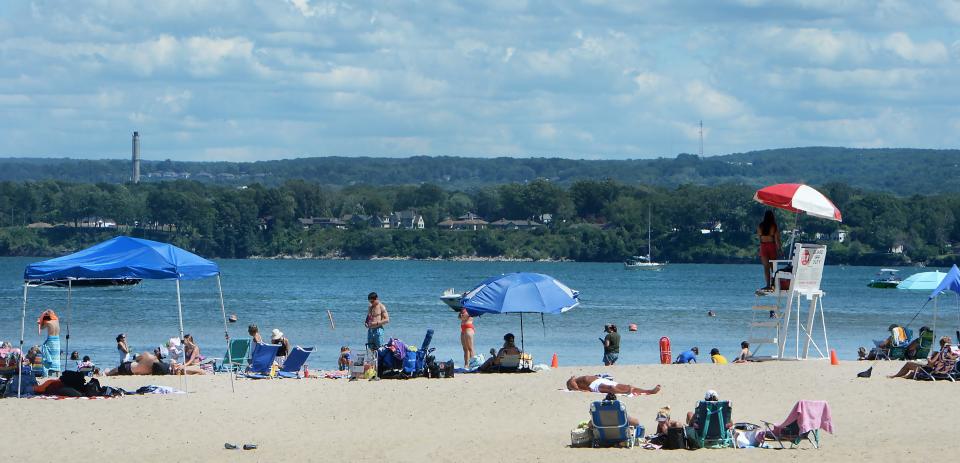Investments in clean Pennsylvania air, land, and water will pay off for decades
- Oops!Something went wrong.Please try again later.
Throughout the past eight years, Pennsylvania has made tremendous investments into our air, our water, and our wild places, and those investments are paying off. This year we are putting more money on the table for attractive and productive landscapes and communities, clean water, and access to outdoor recreation with the largest investment in conservation and environmental programs in decades.
Thanks to leadership from Gov. Tom Wolf, this year's budget includes a $696 million bipartisan program to use federal recovery funds and state allocations for restoration and environmental protection.

For the first time since 2005, we'll add three new parks to our national award-winning system to bring our total to 124. This expands our ability to serve the public with close-to-home, healthy outdoor recreation — the need for which became even more apparent during the pandemic. Additional funding will support development of Pennsylvania's first recreation area dedicated for use by enthusiasts of off-highway vehicles.

There’s also $100 million in federal recovery funds to improve our current state parks and forests, and provide communities with grants for trails, conservation, and recreation. Through the Clean Streams Law, which will assist farmers with best management practices, the Department of Conservation and Natural Resources will receive $8.8 million for the Keystone Tree Fund to plant trees along streams and in communities, helping to prevent flooding and create a more climate-resilient landscape. There's also funding to expand our scientific capability around carbon capture and storage, and continued support for the Pennsylvania Outdoor Corps that connects young people to jobs in conservation.
This year's budget investments are just the latest result of the Wolf administration's commitment to protect and preserve our precious natural resources. Over the past eight years, Pennsylvania has made investments in clean air, land, and water that will pay off for decades to come.
Communities in the Susquehanna and Potomac watersheds have seen tremendous improvements in their streams and rivers. The Healthy Waters, Healthy Communities effort to improve the waters that flow into the Chesapeake Bay has been very successful. Farmers, foresters, and government officials from municipalities, counties, and state government, along with many others, have found ways to reduce runoff pollution and improve river and stream health. Those efforts are paying dividends, with unprecedented progress in reducing pollution: 6.77 million pounds of nitrogen pollution and 300,000 pounds of phosphorus pollution reduced as of 2020.
Protecting water has been a priority of the Wolf administration. When two PFAS chemicals were detected in water supplies in southeastern Pennsylvania, the Department of Environmental Protection worked to reduce the pollution from the source and remove it from drinking water for the local residents. Now DEP is working to implement drinking water standards across Pennsylvania that will protect people from these emerging contaminants.
Under the Wolf administration, more than 2,500 leaking underground storage tanks were removed to protect Pennsylvania's groundwater. And in Lancaster, DEP completed a $21 million project to remove trichloroethylene (TCE) from groundwater and protect the drinking water for more than 400 residents and businesses.
The Wolf administration has also prioritized protecting air quality. In 2018, DEP began the Driving PA Forward initiative, using the settlement funds from the e Volkswagen cheating scandal. Grant and rebate programs were put in place to replace older, dirty diesel engines with cleaner alternatives. Cleaner trucks, buses, and trains are reducing air pollution in the state, and more than 1,500 electric vehicle charging plugs have been installed, many of them in environmental justice communities. Other programs, like the Alternative Fuel Rebate for consumers and the Alternative Fuel Incentive Grants, reduced greenhouse gas emissions and made electric cars more accessible to Pennsylvania drivers.
DEP also reduced air pollution from stationary sources — including cutting sulfur dioxide emissions by 84% since 2014 and reducing methane leaks from new natural gas wells by 32%.
As impressive as all this work has been, it cannot only be for some Pennsylvanians — it must be for all. This is why both DEP and DCNR have made concerted efforts to reach and protect environmental justice communities to ensure that all people, regardless of their ZIP code, have equal access to a healthy and safe environment. In October 2021, Gov. Wolf signed the Environmental Justice Executive Order to cement the administration's commitment to this work moving forward to ensure that these communities are fully included.
Looking to the future, the biggest threat to Pennsylvania's communities, public health, and environment is climate change. We are already feeling the effects, with warmer summers and less snowfall in the winter. The Wolf administration has set Pennsylvania on a course to reduce the carbon pollution that is causing the climate crisis and preparing the people and businesses for the unavoidable impacts like increased flooding.
We also are taking steps to reduce the pollution causing climate change by promoting electric vehicles, wind and solar renewable energy, and cutting down carbon pollution from power plants. Earlier this year the Wolf administration finalized a regulation to participate in the Regional Greenhouse Gas Initiative, a multi-state compact that has reduced carbon pollution and kept electricity rates low in a dozen northeast and mid-Atlantic states. We will continue to fight to clean Pennsylvania's air and fight climate change.
By protecting and restoring air, lands, and waterways, we're supporting our constitutional rights to a clean environment and a creating a better future for all Pennsylvanians. The past eight years of success are a track record that would make any administration proud.
Cindy Adams Dunn is secretary of the Pennsylvania Department of Conservation and Natural Resources. Ramez Ziadeh is acting secretary of the Pennsylvania Department of Environmental Protection.
This article originally appeared on Erie Times-News: PA investments in clean air, land, and water will pay off for decades

